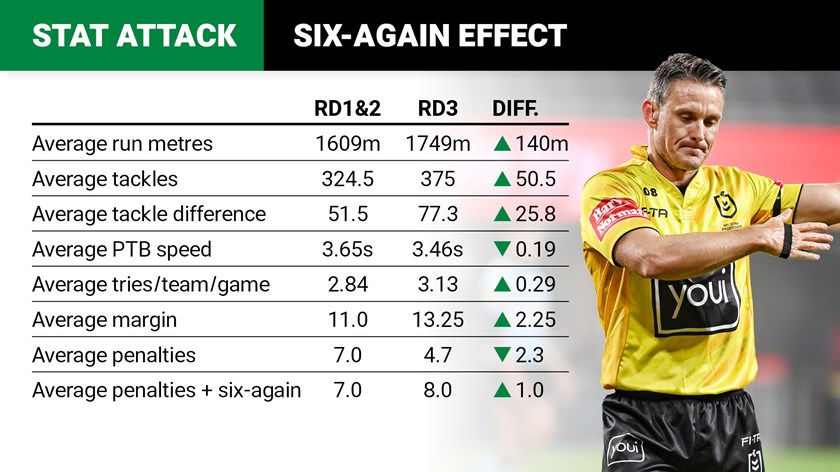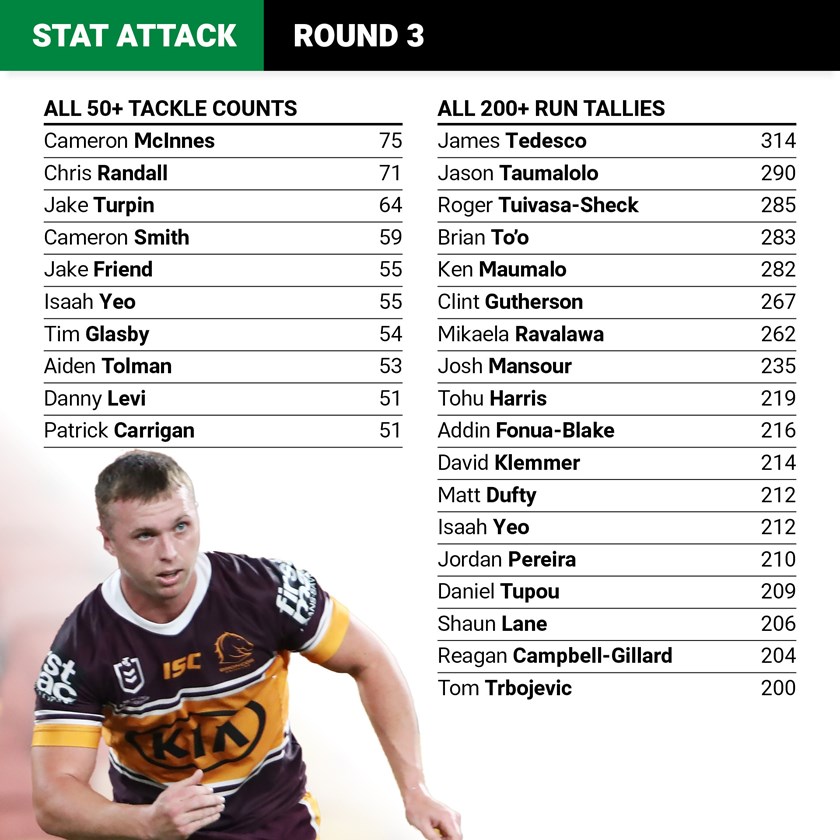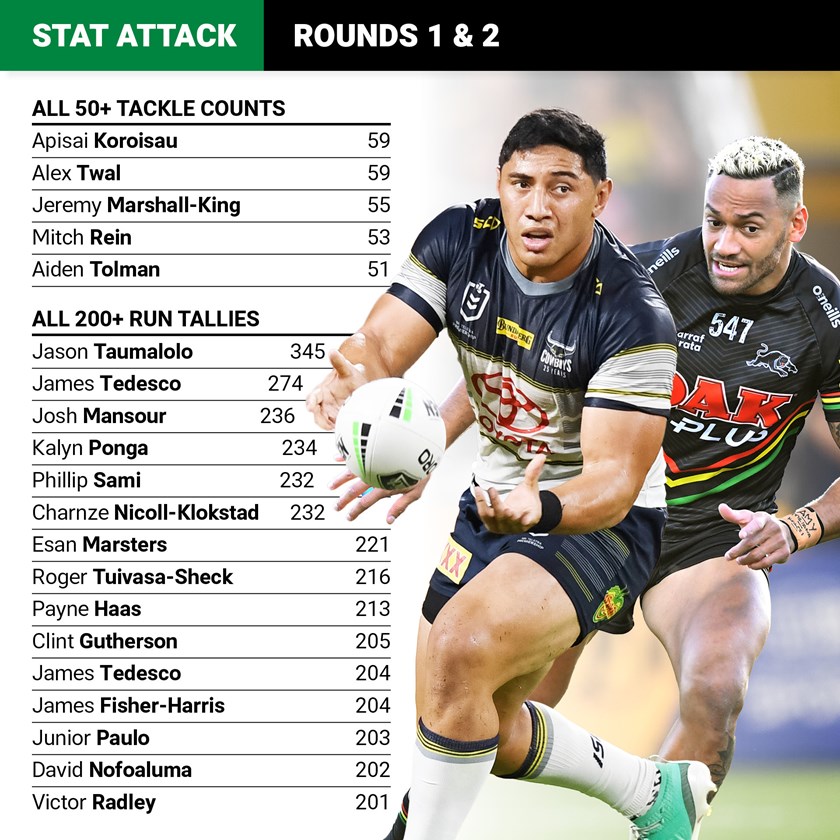
Just one week into the new six-again rule, the changes to the game are as pronounced as they were immediate.
After one weekend of the new rule and reduction to one referee, games have seen a massive jump in run metre tallies and tackle counts, with ball-in-play time up, penalties down and significantly quicker play-the-balls.
Another by-product – from what is so far a very limited sample size – has been a huge increase in the difference between the statistics of two opposing sides, with possession counts heavily favouring one side in almost every game.
NRL.com crunched the numbers on the first round of the new rules and what implications they may have for the rest of the season.

Penalties down, ball in play up, faster play
There were seven penalties per team per game in the first two rounds, or an average of 14 per match. That dropped to below five penalties per team in round three, with a consequential increase in ball-in-play time from 54 minutes and 42 seconds to 57 minutes and 31 seconds – or almost three minutes' extra play per match in round three.
There was around 10 extra seconds (from 55 seconds to 65 seconds) between stoppages on average.
Of interest, there were 53 set restarts (or 'six-again' rulings). When added to the penalties that were given that makes around eight infringements per team per game – up slightly on the seven penalty average from the opening two rounds.
The ruck speed was noticeably faster, with play-the-balls dropping from a 3.65 second average across the first two rounds to just 3.46 seconds in round three.

More runs, more tackles
There are more than a few NRL players who earned a sleep in on Monday after the extra work they had to do in their first game back.
The average run metres per team per game over the opening two rounds was 1609; that spiked to 1749 in round three, an increase of 140 metres across each club.
Tackles were up too, from 324 per team per game in the opening two rounds to 375 in round three – just over 50 tackles for every team.
In order to compare apples with apples, those numbers exclude the 10 minutes of extra time in the Penrith v Newcastle game.
But the extra load was certainly not shared equally, as the teams starved of ball were forced to tackle to the point of exhaustion.

More lopsided scores and stat sheets
The average difference in tackle counts in the first 16 games of the year is 51.5. That is, in each game, the team forced into more defence had to make 51 tackles on average more than their opposition.
That includes the Eels' round two demolition of Gold Coast, when the Titans had to make 175 tackles more than their opponents.
That average jumped to 77.3 in round three with the Titans (185), Broncos (152), Dragons (83) and Knights (85 at the end of 80 minutes) forced into far more defence than their opponents.
It's no secret the matches were more one-sided in round three either. Bear in mind it is still a small sample size and as some of the teams better-suited to the new rules face each other in the coming weeks this may level out.
But over the opening two rounds, the average margin of victory was 11 points – including the 40-point margin between Parramatta and Gold Coast.
Across right games in round three, including the zero-point margin in the 90-minute draw, the average margin was just over 18, an increase or more than seven. No games other than the draw were decided by fewer than 12 points.
There were also just more tries scored overall, with teams averaging 2.84 tries per game in rounds one and two, up to 3.1 in round three.
Playmakers exploit advantages on the edge
Players earn their pay
Unsurprisingly, there were some huge individual contributions propping up the radically increased team totals.
In the 16 games over the first two rounds, there were just four instances of a player making 50 or more tackles in a game, with a high of 59 by Api Koroisau and Alex Twal.
In round three (if we cut off the extra time game at the end of 80 minutes), there were 10 tackle counts of 50 or more, headed by Cam McInnes with a remarkable 75 (none missed). Knights rookie Chris Randall made 69 off the bench (and made two more in golden point), while Jake Turpin (64) also went past 60.
Similarly with run-metre tallies, there were 15 players who passed 200 metres in the opening two rounds, with Jason Taumalolo's absurd 345 against Canterbury the biggest individual total of the year.
James Tedesco (274 and 204) was the only player to do so both weeks. Josh Mansour (236), Kalyn Ponga (234), Phillip Sami and Charnze Nicoll-Klokstad (232) had the biggest individual totals.
In round three (against minus the extra time contributions) there were 18 individual totals over 200, headed by Tedesco (314). Taumalolo (290) went close to the triple while both Penrith wingers Josh Mansour (235) and Brian To'o (283) ended up with over 300 metres at the end of extra time.
No need to panic over Taumalolo injury
Looking ahead
There is one game this week where two of last week's dominant teams – the Eels and Sea Eagles – face each other. That will give a better indication as to whether the new rules simply suit some teams better or if it's more a case of whoever wins the opening 10 minutes just runs away with the game.
Some of the teams that were soundly beaten in round one – like the Storm, Rabbitohs and Broncos – look too good on paper not to learn a few lessons and could well adapt quickly to the new normal.
There will likely be some swings and roundabouts as coaches and clubs adapt but it will be interesting to see if these numbers are maintained through the coming rounds.






